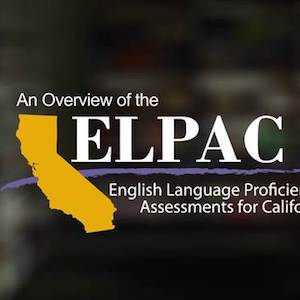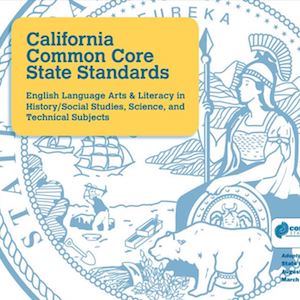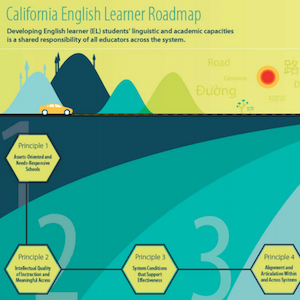 San Mateo County Office of Education supports districts in ensuring English learner success by providing information on state and federal requirements, policies, and best practices and by creating opportunities for administrators, educators, counselors, and other school staff to network and share their experience and knowledge with each other.
San Mateo County Office of Education supports districts in ensuring English learner success by providing information on state and federal requirements, policies, and best practices and by creating opportunities for administrators, educators, counselors, and other school staff to network and share their experience and knowledge with each other.
Resources and professional learning opportunities, including support for the CA English Language Development standards, the English Learner Roadmap, and the State Seal of Biliteracy are available to support and sustain leadership, curriculum and instruction, and achievement for English learners.
If you would like to be added to our listserv, please email earenas@smcoe.org.
Multilingual Learner Leadership Network (MLLN)
2024-2025 MLLN Meeting Dates (VIRTUAL)
September 6th, 2024 from 12pm to 2pm
December 13th, 2024 from 12pm to 2pm
March 14th, 2025 from 12pm to 2pm
May 16th, 2025 from 12pm to 2pm
Multilingual English Learner Consortium (MELC)
Target Audience: District Administrators, site administrators, teacher leaders and coaches
The goal of the Multilingual English Learner Consortium is to support districts in aligning their current practices with state and federal policy and going beyond to ensure English learner success. These meetings provide current information and resources for supporting multilingual learners and opportunities for discussion and networking across the county. Occasionally, guest speakers are invited to provide expert advice on current issues.
2024-2025 MELC Meeting Dates: (REGISTER HERE)
September 12th, 2024 from 9am to 11:30 am
October 10th, 2024 from 9am to 11:30am
January 16th, 2025 from 9am to 11:30am
March 21st, 2025 from 9am to 11:30am
Multilingual Learners Professional Learning Opportunities (Hosted at San Mateo County Office of Education)
Name |
Date |
Time |
Registration Link |
|
Empowering Educators: Transforming Newcomer Support Together |
September 11th, 2024 | 8:30am to 4pm | Register here. |
| Translanguaging in the Elementary Classroom | December 11th, 2024 | 8:30 am to 4pm | Coming soon. |
| Translanguaging in the Classroom grades 6-12 | January 22nd, 2025 | 8:30am to 4pm | Coming soon. |

Professional Development through EL RISE!
From 2020 - 2023, the EL RISE! (English Learner Roadmap Implementation for Systemic Excellence) team designed research-based professional learning materials to build capacity to implement the EL Roadmap across the state. While the grant has ended, resources on the EL RISE! Microsites are available to all! Check out the 25 different offerings here.
English Language Proficiency Assessments for California (ELPAC)
The English Language Proficiency Assessments for California (ELPAC) is the required state test for English language proficiency that must be given to students whose primary language is a language other than English.
Initial ELPAC and Initial Alternate ELPAC
The purpose of the Initial ELPAC is to determine the English proficiency of students entering California schools for the first time who have a primary language other than English. Identifying students who need help learning in English is important so students receive the support they need to do well in school while receiving instruction in all school subjects. California state law requires that schools administer the initial ELPAC within 30 calendar days of a student's enrollment. Learn more here: Initial ELPAC and Initial Alternate ELPAC.
Interim ELPAC
Interim assessments are designed to support teaching and learning throughout the year. The ELPAC Interim Assessments are aligned with the 2012 California English Language Development Standards and are organized by domain—Listening, Speaking, Reading, and Writing—for each of the following grade levels and grade spans: Kindergarten; 1st; 2nd; 3rd-5th; 6th-8th; 9th-10th; 11th-12th. The ELPAC Interim Assessments will be available for preview on September 19, 2023, with full access to administer on October 19, 2023.
Observation Protocol for Teachers of English Learners (OPTEL)
Information about the Observation Protocol for Teachers of English Learners (OPTEL), a resource to support educators in monitoring and evaluating language use of English learner (EL) students. The OPTEL is a statewide standardized protocol for reclassification Criterion 2 (teacher evaluation of English learner [EL] students) and Criterion 3 (parent opinion and consultation).
California State Seal of Biliteracy and Biliteracy Pathways
The State Seal of Biliteracy (SSB) recognizes high school graduates who have attained a high level of proficiency in speaking, reading, and writing in one or more languages in addition to English. This achievement is marked by a gold seal on the diploma or transcript of the graduate. The CDE has released the new SSB requirements for the 2023-24 school year to align with the passing of Assembly Bill 370, along with updated SSB Frequently Asked Questions (FAQs).
 The rationale behind celebrating biliteracy is to:
The rationale behind celebrating biliteracy is to:
- Recognize and value students' biliteracy skills
- Encourage students to study languages
- Encourage family and community support of the development of the home language and the study of additional languages
- Certify attainment of biliteracy
- Strengthen intergroup relationships, affirm the value of diversity, and honor the multiple cultures and languages of a community
- Provide universities with a method to recognize biliteracy
- Provide employers with a method of identifying people with language and biliteracy skills
- Prepare students with 21st-century skills
Biliteracy Pathway Recognitions
The Biliteracy Pathway Recognitions are established to recognize preschool, kindergarten, elementary, and middle school students who have demonstrated progress toward proficiency in speaking, listening, reading, and writing in one or more languages in addition to English. The three Biliteracy Pathway Recognitions available are: Biliteracy Program Participation Recognition, Home Language Development Recognition, and Biliteracy Attainment Recognition.
Resources
Luis Rodriguez, Ed.D
Coordinator, Multilingual Support Services
Email: lrodriguez@smcoe.org
Phone: (650) 802-5407
Carla Llewelyn-Vasquez
Coordinator, Language and Literacy
Email: clvasquez@smcoe.org
Phone: (650) 802-5626



